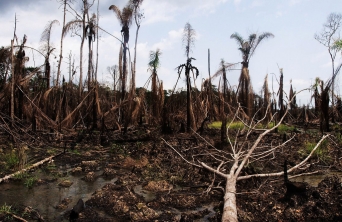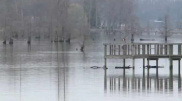Nigeria's Oil: A Brief History
Since oil operations began, 546 million gallons of oil have spilled into Nigeria's Niger Delta.
That's the equivalent of an Exxon Valdez Disaster happening every year for nearly 50 years.
The most controversial spills come from pipeline blasts. Over the past two decades, at least a dozen pipeline disasters have killed thousands in Nigeria.
Many pipeline explosions are said to have been caused by villagers tampering with the oil lines. Due to the region's abject poverty -- 70 percent of Nigerians live below the poverty line -- some resort to siphoning and selling oil from the region's 3,125-mile network of pipelines.
A deadly blast
One of the nation's most deadly blasts occurred on Oct. 18, 1998, when a pipeline owned by the Nigerian National Petroleum Corp. (NNPC) exploded in Jesse, Nigeria. It created a fire that killed hundreds within hours and destroyed surrounding farmland and villages.
Early reports said that the explosion was caused by thieves trying to break open the pipeline in order to siphon off oil. Before the explosion, Nigerians outside of Jesse traveled there to scoop up oil that had been leaking from the pipeline. Charred remains found in the ruins were still grasping funnels and cans.
Some in the town refused medical help for fear of being blamed for the disaster, causing a spike of deaths due to untreated burns and wounds.
They are afraid of being arrested. And they would prefer to die with their fear.
On Oct. 23, the fire was finally put out by an American firefighting company. According to USA TODAY, a total of 1,082 deaths were attributed to the disaster.
Need or greed?
Both Chevron and Royal Dutch Shell have worked with the NNPC for decades and coordinate much of the country's oil operations. Oil industry officials often blame greed and political maneuvering for the pipeline disasters. However, environmental groups claim that some spills are caused by pipeline corrosion and mismanagement by the oil companies.
Local government and community leaders say destitute villagers are forced into pipeline vandalism because of vast socio-economic inequity. Local land and water sources have been fouled by the oil industry, rendering areas useless that once kept fishermen and farmers employed.
The industry needs to put their money where their mouth is if it expects to end communal violence. People without jobs or food in their stomachs can be moved to desperate acts.
Beyond economic effects, Nigeria's environment has been harmed as well. As much as 10 percent of the country's mangrove forests have disappeared due to oil pollution and growing areas of farmland are proving uninhabitable.
Fighting back
Many groups have organized against the management of Nigeria's oil. Nigerian militants regularly kidnap foreign oil workers either to demand control of oil revenues or increase jobs and improve working conditions.
Others practice nonviolence through protesting and activism, which have been successful. In 2002, 150 Nigerian women occupied a Chevron facility for 10 days. They negotiated major concessions, including new schools, health clinics, electricity and water systems for the area around Escravos, Nigeria.
However, some activists are met with resistance and severe penalties for their work. In 1995, Ken Saro-Wiwa, an environmental activist from Nigeria's Ogoniland in the Niger Delta, and eight others were executed after spending months in prison. They were accused of killing other environmentalists in the region. His advocates say he was framed as he was well known for his criticism of Nigeria's military regime and oil dealings.
In 1996, the Center for Constitutional Rights, EarthRights International, and other law groups brought a series of cases against Shell for alleged human rights violations in the region. Royal Dutch Shell eventually paid out $15.5 million in 2009, but did not accept accountability. Instead, the oil company called the payout a “humanitarian gesture”.
Pipeline syphoning still occurs. In June 2011, sabotaged pipelines cut into production so much that Shell declared force majeure, freeing itself from delivery obligations.
Shell is currently fighting a $100 million fine assigned by a Nigerian court, eschewing any responsibility for pollution caused by sabotage. Peter de Wit, director of Shell Netherlands, told the AP:
"When it comes to issues of the safety of people and crime ... it's the responsibility of the government. That's not happening. But you can't lay it on our doorstep."






